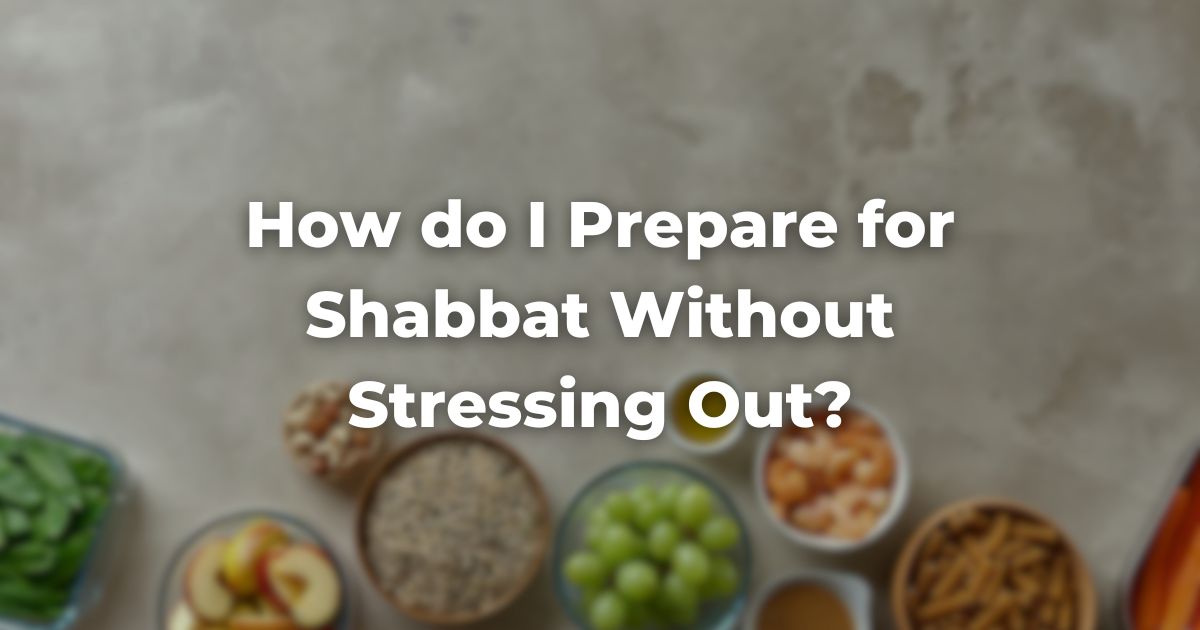By Friday, most of us are ready for a break from our busy weeks. Shabbat is that break. A day when we rest from all our business and productivity, and relax with loved ones and our community.
But the irony of treating Saturday as Shabbat, and not only a day off of work, is that we have to prepare for Shabbat. In order to rest from all creative work on Shabbat, including cooking and cleaning, we have to prepare in advance. So instead of Friday afternoon being the anticipation and wind down to the weekend, the hours leading to Shabbat can turn into the most stressful of the week as we rush to prepare everything in time.
Practically
Practically speaking, the key to a stress-free Erev Shabbat, aka Friday, is advance preparation.
We can plan Shabbat meals and shop earlier in the week. Some, if not all of the food should be started on Thursday. This frees time on Friday to clean and set up before sundown.
Having a list of all of these tasks on the fridge can make things go smoother.
Giving oneself buffer time is another simple way to take some of the stress away. Ideally, one should plan to leave enough time before Shabbat to sit with loved ones over coffee or tea and a slice of cake. That way one can enter Shabbat already feeling relaxed.
Having said all that, it is much harder to actually achieve this. I have a 6-month old baby. “Dad plans and baby cries” goes hand and hand with the yiddish proverb “Man plans and G-d laughs.” Every time I meal plan and shop in advance, he cries or the gas for the stove runs out or something happens, and I’m once again scrambling to finish cooking before sundown.
So no matter what happens, all you can do is try your best.
Spiritually
While the practical timing aspects of Shabbat preparation are important, they only work in a perfect world without distractions and surprises. Therefore, achieving a stress-free Erev Shabbat depends more on our mental attitude than on our physical preparation.
If we shift thinking about Shabbat prep from a chore to part of our spiritual practice of Shabbat, we add meaning to our preparations and take away some of the stress.
In the TalmudReferring to one of two collections, the Jerusalem and Babylonian Talmuds, edited in the 6th century, that contains hundreds of years of commentary, discussion, and exploration of the ideas in the Mishnah. One could describe it as Mishnah + Gemara = Talmud Read more, in Tractate Shabbat, there is a list of all of the things different rabbis would do to prepare for Shabbat.
Rabbi Abbahu would sit on an ivory chair [takhteka] and fan the fire cooking the food for Shabbat … Rav Safra would roast the head of an animal to prepare it for Shabbat. Rava salted a shibuta fish. Rav Huna kindled lamps. Rav Pappa spun the wicks for the Shabbat lamp. Rav Ḥisda cut the beets in preparation for Shabbat. Rabba and Rav Yosef cut wood. Rabbi Zeira prepared thin sticks for kindling. (Shabbat 119a)
Many of these were wealthy and had servants to do the preparations. But they viewed Shabbat prep as a mitzvah and therefore made sure to participate, even in small ways.
By viewing Shabbat prep as a mitzvah, even that last minute rush to finish cooking on a busy Friday becomes a spiritual practice.
We can prepare as much as possible and still find ourselves scrambling before Shabbat. But rather than considering what we’re doing a hassle before we can rest, we can treat it as a rich part of our Shabbat observance.
Author
-

Joshua Klein is a rabbinical student at The Schechter Rabbinical Seminary in Jerusalem, and previously studied at The Jewish Theological Seminary. He was a fellow in the first cohort of the Exploring Judaism's Writer's Fellowship. Joshua grew up in South Florida and before rabbinical school he worked in healthcare software in Wisconsin. Joshua has interned with synagogues in the US and Israel, with the Nativ Gap Year Program and Ramah’s high school in Israel program, and also worked as a chaplain intern at NewYork-Presbyterian Queens. While in New York, Joshua was also involved in Jewish climate activism. In his spare time, Joshua enjoys cooking, reading, writing, and wandering in museums or nature.
View all posts






